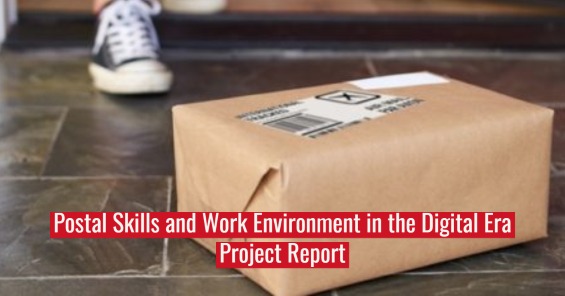Postal Skills and Work Environment in the Digital Era – Project Report
01.12.22

The European postal sector continues undergoing transformations and diversification in terms of products and services. The financial crisis that began in 2008, the complete liberalization process of the sector, the European social and economic policies launched at the beginning of the Covid-19 pandemic have impacted, and still continue to impact the sector. Digitalisation in the postal sector has drastically impacted both traditional and emerging job profiles across Postal Occupational Areas.
The Training, Health and Safety Working Group of the Social Dialogue Committee for the European Postal Sector (SDC) carried out the project: Postal Skills and Work Environment in the Digital Era.
The project allowed an in-depth analysis of two main areas: the impact of digitisation on skills and training and the impact of digitisation on the working environment. The project addressed the following job areas: Back-Office operations, Delivery operations, Post-Offices networks. It enabled a joint reflection on the skills needed in a constantly changing work context, bearing in mind the impact of phenomena such as digitisation and e-commerce on the sector. The study confirms the key role of employees’ training and retraining in managing the profound changes affecting the sector, notably digitisation.
Skills needs are becoming more and more strategic, especially for new products and services affecting the postal sector due to the diversification process. Particularly strategic, moreover, is the growing importance of soft skills for the performance of new products and services, very often of proximity. The project addressed the evolving relationships between digital transformation, new skills and work environments. Alongside the digitalisation, the study also focused on the future impact of COVID-19 on the postal sector, an issue which is closely intertwined with digital acceleration. The project also addressed the impact of the Covid-19 pandemic on the methodologies of training and retraining programmes. The study covers the changes in tasks, skills and work environments within three key Occupational Areas of the postal sector: Back-Office operations, Delivery operations, Post-Offices networks. The study was based on the implementation of multiple data collection tools, combining desk and field research, primary and secondary sources. Stakeholders provided feedback during the organised Seminars for each Occupational Area. The Skills Reference and Work Environment Framework Report (SWEF) summarises main findings for each Area. The Final Conference focused on cross-cutting trends and comparisons between the Occupational Profiles. The Final Report can be found here in English, French, and German.
Skills Reference and Work Environment Frameworks
Back-office Operations
For Back-Office Operations, a significant change in the tasks is not envisioned in the near future. However, a shift in the technology employed in Back-office Operations may cause a disruption of established routines. In terms of future skills, this job profile will in the next 5 years need soft skills (critical thinking, active listening, time management) more than any technical ‘hard skill’. However, the main future tasks include ‘getting information’ and ‘interacting with computers’, which require, to some extent, digital skills. The training in this Occupational Area is found somewhat lacking, specifically with regard to soft skills, whose future importance require dedicated training initiatives. In terms of Health and Safety, the introduction of collaborative robots, and the start of the transition towards a ‘smart warehouse’ can help reduce physical strain. Yet, other technological advancements such as wearable devices could lead to more stress for workers. Social dialogue can be a mitigating factor and contribute to reduce said stress. In the case of wearable technology, communication between employees and employers to establish clear limits on the kind of data that can gathered may reduce the stress caused by their introduction.
Delivery of Postal Items
Future tasks for this job profile will change drastically in the next 5 years, given the number of new services postal carriers will provide. They may include interfacing with digital devices, data collection, energy diagnosis, proximity services and delivery of essential goods. Future skills include familiarity with devices and new procedures, resilience, product-specific skills and knowledge. Soft skills are very highly considered for this profile, specifically in light of the digitalisation of the sector. Training methodologies are not fit for all future skills. For instance, just-in-time learning is suitable for minor technological updates and for learning quick procedures, but face-to-face learning is essential for soft skills and for major technological changes (e.g. the introduction of a new device). In terms of Health and Safety, the introduction of autonomous mobile robots to assist the delivery person, which could contribute to reduce stress and improve safety, will likely not be introduced in a significant capacity in the near future. Meanwhile the information collected shows some concerns for the potential stress caused by a decrease in interaction between colleagues as a result of the COVID-19 pandemic and a concern for platform work. Improved communication with employees and training administered with suitable modalities may reduce these discomfort factors.
Post Office Networks
The future tasks for this job profile are expected to change significantly in the near future, since new services are starting to be provided in post offices. In particular, new tasks will include consultancy on insurance, energy services or financial matters, familiarity with new procedures and increased interactions with the public. In order to sustain the new service offerings, new skills will be required in the next 5 years: relational skills, product-specific skills and knowledge (relative to the new services), soft skills for both Postmasters and Postal Clerks. Training can be improved, specifically for Postal Clerks and for particular topics, i.e. soft skills, both in terms of quality and quantity. Health and Safety risks include poor posture, eye discomfort and other negative effects of the sedentary office lifestyle, as well as stress for the new roles. Social dialogue has been identified as a mitigating factor when employed to advocate for a stricter separation of training time and working time, as well as between work time and free time.
Cross-cutting findings
Digitalisation
For each new profile, some degree of technological improvement is envisioned in the near future. Such technological changes are recognised as potentially useful for the job profiles, both in terms of reducing physical strain and in terms of streamlining of repetitive procedures. Some of the changes include: new software, wearable devices and new machinery to handle heavy weights for Back Office Operations; new portable devices and new apps and procedures connected with the new proximity services provided for the Delivery of Postal Items; new software and new procedures concerning insurance, energy, connectivity and financial services. Nevertheless, the disruption of established work routines, the lack of familiarity with new devices and insufficient training may also constitute a severe stress factor. For Delivery of Postal Items and Post Office Networks, technological changes are designed to accommodate for new business models and service offerings. The degree of digitalisation throughout the EU is not homogenous. In some areas of Europe, the digital transition is still in its initial phase. Current trends in digitalisation have been accelerated by the COVID-19 pandemic and countries in which postal employees do not have an e-mail account, or post offices are not provided with technological devices, have been forced to expedite the transformation that in other countries took decades.
Soft Skills
As a result of the massive impact that digitalisation is having on the postal sector, the most crucial skills of the future are soft skills, e.g. critical thinking, problem solving, active listening, relational skills like active listening and need understanding. These skills have been consistently ranked at the top of the ranking for future skill needs in all three Occupational Areas. Indeed, the skills required to master a singular technological change are very often micro-skills, or minor changes in procedures that can be learned without excessive efforts. The real discomfort element, our research found, are the continuous updates and technological improvements, their pace and frequency, which can be destabilizing. Soft skills are vital to acquire resilience and adapt to constant transformation of the sector. The ubiquity of soft skills is a direct result of the ubiquity of change in all three Occupational Areas.
COVID-19
COVID-19 had a significant impact on all job profiles and on virtually every aspect of the postal sector. Concerning digitalisation, the sudden acceleration of the digital transformation caused discomfort in those European countries where such a process was in its infancy. Regarding work procedures, the pandemic forced postal operators to implement health and safety protocols (concerning masks, for instance, gloves, limits to the number of people allowed in the post office). Furthermore, existing procedures were modified to accommodate health concerns (e.g., collection of signatures, payment modalities). The pandemic also accelerated the already existing shift from letters to parcels (likely to continue) and caused a spike in e-commerce (which is likely to decrease to pre-COVlD-19 levels). In terms of skills, new procedures to be implemented require new skills and new training concerning those skills, as well as specific knowledge of sanitary equipment. Finally, with regard to training, new topics requiring training were introduced and e-learning became the sole method of training, despite not being the most suitable method for a variety of target skills.
You may also be interested in

4 case studies show the benefit of sectoral collective bargaining
03.06.24
Reports
Meetings & Events
2024
10
Sep
Protected: UNI Europa FATIMA Project – 3rd Steering Group Meeting – 10 September 2024
Commerce
ICT & Related Services
Property Services
